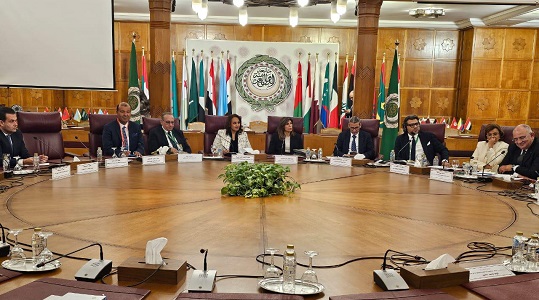The Secretary-General of the Union of Arab Chambers, Dr. Khaled Hanafi, participated in the activities of the fifth edition of the Arab Sustainable Development Week, which was held under the patronage of President of the Arab Republic of Egypt Abdel Fattah El-Sisi during the period from November 24-27, 2024, organized by the League of Arab States and in partnership with the Ministry of Planning, Economic Development and International Cooperation of the Arab Republic of Egypt, with high-level participation from a number of international partners, most notably the European Union, the United Nations, the private sector and civil society institutions.
The Secretary-General spoke at the opening of the Arab Sustainable Development Week, pointing out the importance of drawing a road map for the green transformation in the Arab region, as this transformation represents a pivotal opportunity to reshape our economies on more sustainable foundations and strengthen the role of the private sector as a key driver of economic growth and innovation.
The green transition we seek is not an additional option, but an imperative necessity to reshape our economies on more sustainable and resilient foundations. In a world changing at an unprecedented speed, this transformation represents a golden opportunity to achieve innovative and sustainable economic growth and to exploit diverse potential in sectors such as renewable energy, circular economy, and green technology. Achieving those goals requires collective action and cooperation between governments, the private sector, and international institutions. Despite the challenges, the Arab region has enormous potential to lead this transformation. Youth potential, rich natural resources, and strategic geographic location are key pillars on which to build to achieve this vision in the Arab region.
Dr. Khaled Hanafi noted that despite our region's enormous potential, the private sector's contribution is still below ambition. This is because the Arab region needs to create more than 60 million new jobs by 2030 to meet the needs of a growing population, while current growth rates do not exceed 2-3% in some countries. Youth under the age of 35 make up about 60% of the region's population, making youth unemployment a major challenge.
The Secretary-General revealed that intra-Arab trade represents less than 13% of the total foreign trade of Arab countries, which is modest compared to other economic groups. The region suffers from water consumption rates that exceed three times the global average, putting enormous pressure on water resources. About 30 percent of the food produced in the Arab world is lost due to mismanagement in the supply chain, increasing carbon emissions, and wasting resources. In addition, the rate of women's participation in the labor market in Arab countries is only about 18%, one of the lowest rates in the world.
The Secretary-General of the Union, Dr. Khaled Hanafi, explained that the value of the renewable energy market in the Arab region is estimated at $ 30 billion annually by 2030, which provides huge investment opportunities for the private sector that can benefit from the circular economy that aims to recycle and reduce waste, which enhances profitability and protects the environment. Artificial intelligence and Internet of Things technologies can contribute to improving the efficiency of resource use, such as water and energy, and increasing productivity in agriculture and industry. The private sector can also lead innovation initiatives in areas such as energy storage, desalination technologies, and sustainable transportation systems.
According to the Ma'an initiative, $660 billion is needed to be mobilized annually to achieve the Sustainable Development Goals in the Arab world. This initiative represents an opportunity to strengthen partnerships with international and financial institutions to direct sustainable investments towards green projects. At this level, the World Bank and the Arab Monetary Fund can play a pivotal role in providing financing guarantees and technical advice to projects.
Dr. Khaled Hanafi called for the need to develop regulatory frameworks that facilitate investment in green sectors while reducing bureaucracy and speeding up licensing procedures. As well as strengthening environmental and social governance laws, to encourage companies to adhere to sustainability standards. In addition to providing soft financing packages for small and medium enterprises working in the fields of green technology. Establishing regional centers to support entrepreneurs and provide the necessary training and consultations. Develop regional logistics networks to increase trade efficiency and enhance cooperation in the fields of energy and water. Establishing regional funds to support major projects with environmental and economic impact. As well as launching awareness campaigns aimed at changing consumer behaviors towards the use of sustainable products and services.
The Secretary-General recommended that platforms should be created that bring together investors and projects with environmental and economic returns. Invest in renewable energy grids and digital infrastructure to support the green economy. Preparing educational curricula that integrate the concepts of sustainability, while providing specialized training programs.
He concluded by saying that the private sector has the tools and capabilities to be a key partner in achieving the green transformation. Through cooperation and partnership, we can build a more prosperous and sustainable future that reflects the aspirations of our people and faces the challenges of the era with confidence and creativity.
Source (Union of Arab Chambers)

